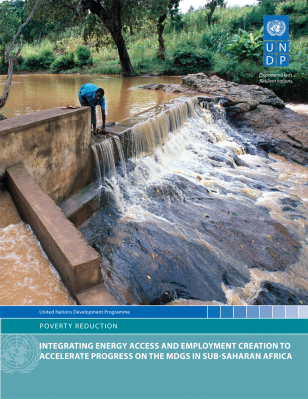Integrating Energy Access and Employment Creation to Accelerate Progress on the MDGs in Sub-Saharan Africa

English
DownloadIntegrating Energy Access and Employment Creation to Accelerate Progress on the MDGs in Sub-Saharan Africa
December 2, 2015
About 380 million people still live under $1.25 a day in Sub-Saharan Africa. Access to energy could power poverty reduction, job creation, improved health services, education and it could open new opportunities to women and girls. Access to energy can help achieve the Millennium Development Goals (MDGs).
However, most people in Sub-Saharan Africa have no access to modern energy services and will continue to live, for the foreseeable future, far from the reach of the grid. How can they benefit from energy services that could improve their lives? Solutions exist – such as modern off-grid, decentralized energy options, often using renewable resources.
Availability of energy is, however, not necessarily converted into new jobs in the absence of access to markets; without the right equipment and skills; without ability to take loans; and in the absence of economic, political and social stability.
This report demonstrates through case studies from Burkina Faso, Kenya, Malawi, Mali, South Africa and South Sudan that complementary policies and programmes can greatly improve the beneficial impact of energy access on unemployment, economic growth, and progress towards the MDGs.
The report identifies barriers and drivers of scaling up energy access, particularly via decentralized and renewable energy options; and it provides guidance on how to maximize the contribution of energy services to employment generation, and through that, to the MDGs.
This report was made possible by generous support from the Government of Denmark.

 Locations
Locations